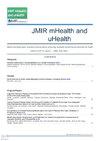Real-World Outcomes of a Digital Behavioral Coaching Intervention to Improve Employee Health Status: Retrospective Observational Study
IF 5.4
2区 医学
Q1 HEALTH CARE SCIENCES & SERVICES
引用次数: 0
Abstract
Background: Chronic noncommunicable diseases (NCDs) account for major disability and premature mortality worldwide, with low- and middle-income countries being disproportionately burdened. Given the negative impact of NCDs on employee performance and work productivity, there is a rising need for stakeholders to identify effective workplace solutions that can improve employee health outcomes. As the workplace becomes more dispersed post pandemic, digital behavioral coaching offers a scalable, personalized, and cost-effective method of managing chronic disease risk factors among employees. Objective: This study aimed to retrospectively evaluate the impact of a digital behavioral coaching program on year-to-year changes in employee health status in a cohort of Indonesian employees. Methods: This retrospective real-world exploratory analysis of secondary health data followed 774 employees of an Indonesian company who completed company-sponsored health screenings between 2021 and 2022 and were given access to Naluri (Naluri Hidup Sdn Bhd), a holistic digital therapeutics platform offering digital behavioral health coaching and self-help tools. Participants were retrospectively classified as those who received active coaching (n=177), passive coaching (n=108), and no coaching (n=489). Linear mixed-effects models were used to evaluate the year-to-year changes in health outcomes across the 3 employee groups, with post hoc analyses evaluating within-group differences between the 2 time points and between-group differences at follow-up. Results: Significant time×group interaction effects were detected for body weight, BMI, hemoglobin A1c, low-density lipoprotein, total cholesterol, and systolic and diastolic blood pressure. Post hoc pairwise comparisons revealed significant improvements in hemoglobin A1c (mean difference [Mdiff]=–0.14, P=.008), high-density lipoprotein (Mdiff=+2.14, P<.001), and total cholesterol (Mdiff=–11.45, P<.001) for employees in the Active Coaching group between 2021 and 2022, with the other 2 groups reporting deteriorations in multiple health outcomes throughout the 2 time points. At follow-up, those who received active coaching between 2021 and 2022 reported significantly lower body weight (P<.001), BMI (P=.001), low-density lipoprotein (P=.045), and total cholesterol (P<.001) than the No Coaching group. Conclusions: This study demonstrates real-world outcomes and implications supporting the use of workplace digital behavioral coaching in improving employee health status. Given the rising burden of NCDs in the Southeast Asian region, our findings underscore the role that workplace digital health interventions can play in preventing and managing chronic disease risk factors. Trial Registration:改善员工健康状况的数字行为指导干预的实际效果:回顾性观察研究
背景:慢性非传染性疾病(NCDs)在全球范围内造成了严重的残疾和过早死亡,中低收入国家的负担尤为沉重。鉴于非传染性疾病对员工绩效和工作效率的负面影响,利益相关者越来越需要找到有效的工作场所解决方案,以改善员工的健康状况。随着大流行后工作场所变得更加分散,数字化行为指导为管理员工的慢性病风险因素提供了一种可扩展、个性化和具有成本效益的方法。研究目的本研究旨在回顾性评估数字化行为指导项目对印度尼西亚员工健康状况逐年变化的影响。研究方法这项对二次健康数据进行的回顾性真实世界探索分析追踪了一家印尼公司的774名员工,他们在2021年至2022年期间完成了公司资助的健康检查,并获得了Naluri(Naluri Hidup Sdn Bhd)的访问权限,这是一个提供数字行为健康指导和自助工具的整体数字治疗平台。参与者被回顾性地分为接受主动辅导者(177 人)、被动辅导者(108 人)和未接受辅导者(489 人)。采用线性混合效应模型评估 3 个员工组的健康结果的逐年变化,并通过事后分析评估两个时间点之间的组内差异和随访时的组间差异。结果显示在体重、体重指数、血红蛋白 A1c、低密度脂蛋白、总胆固醇、收缩压和舒张压方面发现了明显的时间×组间交互效应。事后配对比较显示,在2021年至2022年期间,主动辅导组员工的血红蛋白A1c(平均差[Mdiff]=-0.14,P=.008)、高密度脂蛋白(Mdiff=+2.14,P<.001)和总胆固醇(Mdiff=-11.45,P<.001)均有显著改善,而其他两组员工在这两个时间点的多个健康结果均有所恶化。在随访中,2021 年至 2022 年期间接受积极辅导的员工的体重(P<.001)、体重指数(P=.001)、低密度脂蛋白(P=.045)和总胆固醇(P<.001)均显著低于无辅导组。结论:本研究展示了支持使用工作场所数字化行为指导改善员工健康状况的实际结果和意义。鉴于东南亚地区非传染性疾病的负担日益加重,我们的研究结果强调了工作场所数字健康干预在预防和管理慢性疾病风险因素方面所能发挥的作用。试验注册:
本文章由计算机程序翻译,如有差异,请以英文原文为准。
求助全文
约1分钟内获得全文
求助全文
来源期刊

JMIR mHealth and uHealth
Medicine-Health Informatics
CiteScore
12.60
自引率
4.00%
发文量
159
审稿时长
10 weeks
期刊介绍:
JMIR mHealth and uHealth (JMU, ISSN 2291-5222) is a spin-off journal of JMIR, the leading eHealth journal (Impact Factor 2016: 5.175). JMIR mHealth and uHealth is indexed in PubMed, PubMed Central, and Science Citation Index Expanded (SCIE), and in June 2017 received a stunning inaugural Impact Factor of 4.636.
The journal focusses on health and biomedical applications in mobile and tablet computing, pervasive and ubiquitous computing, wearable computing and domotics.
JMIR mHealth and uHealth publishes since 2013 and was the first mhealth journal in Pubmed. It publishes even faster and has a broader scope with including papers which are more technical or more formative/developmental than what would be published in the Journal of Medical Internet Research.
 求助内容:
求助内容: 应助结果提醒方式:
应助结果提醒方式:


